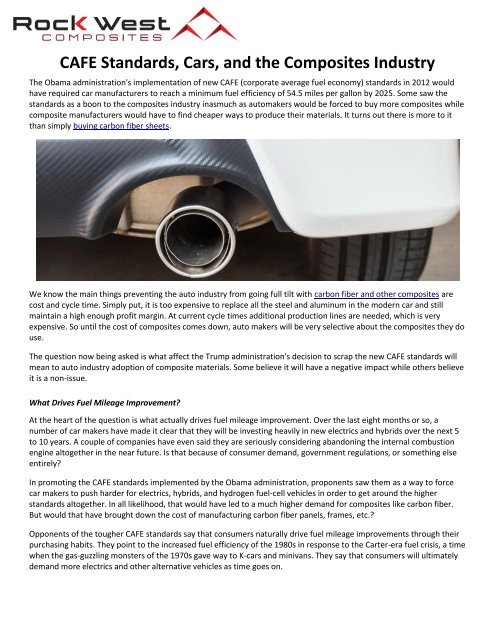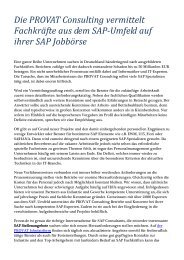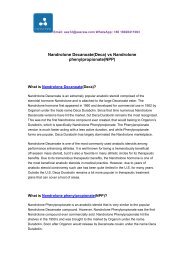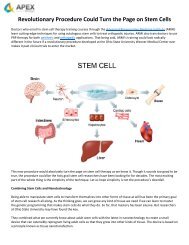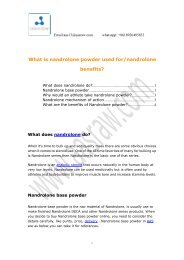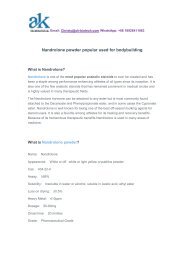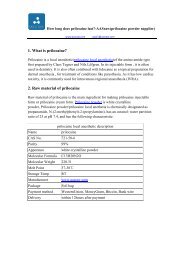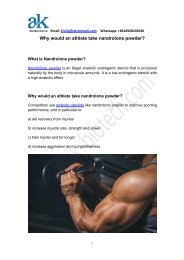CAFE Standards, Cars, and the Composites Industry
https://www.rockwestcomposites.com/plates-panels-angles/carbon-fiber-plate - The Obama administration's implementation of new CAFE (corporate average fuel economy) standards in 2012 would have required car manufacturers to reach a minimum fuel efficiency of 54.5 miles per gallon by 2025. Some saw the standards as a boon to the composites industry inasmuch as automakers would be forced to buy more composites while composite manufacturers would have to find cheaper ways to produce their materials. It turns out there is more to it than simply buying carbon fiber sheets.
https://www.rockwestcomposites.com/plates-panels-angles/carbon-fiber-plate - The Obama administration's implementation of new CAFE (corporate average fuel economy) standards in 2012 would have required car manufacturers to reach a minimum fuel efficiency of 54.5 miles per gallon by 2025. Some saw the standards as a boon to the composites industry inasmuch as automakers would be forced to buy more composites while composite manufacturers would have to find cheaper ways to produce their materials. It turns out there is more to it than simply buying carbon fiber sheets.
Create successful ePaper yourself
Turn your PDF publications into a flip-book with our unique Google optimized e-Paper software.
<strong>CAFE</strong> <strong>St<strong>and</strong>ards</strong>, <strong>Cars</strong>, <strong>and</strong> <strong>the</strong> <strong>Composites</strong> <strong>Industry</strong><br />
The Obama administration's implementation of new <strong>CAFE</strong> (corporate average fuel economy) st<strong>and</strong>ards in 2012 would<br />
have required car manufacturers to reach a minimum fuel efficiency of 54.5 miles per gallon by 2025. Some saw <strong>the</strong><br />
st<strong>and</strong>ards as a boon to <strong>the</strong> composites industry inasmuch as automakers would be forced to buy more composites while<br />
composite manufacturers would have to find cheaper ways to produce <strong>the</strong>ir materials. It turns out <strong>the</strong>re is more to it<br />
than simply buying carbon fiber sheets.<br />
We know <strong>the</strong> main things preventing <strong>the</strong> auto industry from going full tilt with carbon fiber <strong>and</strong> o<strong>the</strong>r composites are<br />
cost <strong>and</strong> cycle time. Simply put, it is too expensive to replace all <strong>the</strong> steel <strong>and</strong> aluminum in <strong>the</strong> modern car <strong>and</strong> still<br />
maintain a high enough profit margin. At current cycle times additional production lines are needed, which is very<br />
expensive. So until <strong>the</strong> cost of composites comes down, auto makers will be very selective about <strong>the</strong> composites <strong>the</strong>y do<br />
use.<br />
The question now being asked is what affect <strong>the</strong> Trump administration's decision to scrap <strong>the</strong> new <strong>CAFE</strong> st<strong>and</strong>ards will<br />
mean to auto industry adoption of composite materials. Some believe it will have a negative impact while o<strong>the</strong>rs believe<br />
it is a non-issue.<br />
What Drives Fuel Mileage Improvement?<br />
At <strong>the</strong> heart of <strong>the</strong> question is what actually drives fuel mileage improvement. Over <strong>the</strong> last eight months or so, a<br />
number of car makers have made it clear that <strong>the</strong>y will be investing heavily in new electrics <strong>and</strong> hybrids over <strong>the</strong> next 5<br />
to 10 years. A couple of companies have even said <strong>the</strong>y are seriously considering ab<strong>and</strong>oning <strong>the</strong> internal combustion<br />
engine altoge<strong>the</strong>r in <strong>the</strong> near future. Is that because of consumer dem<strong>and</strong>, government regulations, or something else<br />
entirely?<br />
In promoting <strong>the</strong> <strong>CAFE</strong> st<strong>and</strong>ards implemented by <strong>the</strong> Obama administration, proponents saw <strong>the</strong>m as a way to force<br />
car makers to push harder for electrics, hybrids, <strong>and</strong> hydrogen fuel-cell vehicles in order to get around <strong>the</strong> higher<br />
st<strong>and</strong>ards altoge<strong>the</strong>r. In all likelihood, that would have led to a much higher dem<strong>and</strong> for composites like carbon fiber.<br />
But would that have brought down <strong>the</strong> cost of manufacturing carbon fiber panels, frames, etc.?<br />
Opponents of <strong>the</strong> tougher <strong>CAFE</strong> st<strong>and</strong>ards say that consumers naturally drive fuel mileage improvements through <strong>the</strong>ir<br />
purchasing habits. They point to <strong>the</strong> increased fuel efficiency of <strong>the</strong> 1980s in response to <strong>the</strong> Carter-era fuel crisis, a time<br />
when <strong>the</strong> gas-guzzling monsters of <strong>the</strong> 1970s gave way to K-cars <strong>and</strong> minivans. They say that consumers will ultimately<br />
dem<strong>and</strong> more electrics <strong>and</strong> o<strong>the</strong>r alternative vehicles as time goes on.
Only Time Will Tell<br />
So, who's right? Only time will tell. One thing we do know for sure is that it's going to take more than lowering <strong>the</strong> cost<br />
of buying carbon fiber sheets to get <strong>the</strong> car makers fully on board with composites. Until our industry finds cheaper<br />
ways of manufacturing <strong>the</strong> materials auto manufacturers need to increase fuel efficiency, <strong>the</strong>y are going to be hesitant<br />
to invest in composites.<br />
Perhaps higher <strong>CAFE</strong> st<strong>and</strong>ards would have motivated auto makers to start getting more involved in composites now.<br />
Perhaps <strong>the</strong>y would not. That's <strong>the</strong> tricky thing about economics. It's hard to tell where any particular industry might go<br />
based on government regulations <strong>and</strong> m<strong>and</strong>ates.<br />
If <strong>the</strong>re is any positive take away from <strong>the</strong> <strong>CAFE</strong> st<strong>and</strong>ards debate it is this: it is only a matter of time before <strong>the</strong> auto<br />
industry fully embraces carbon fiber <strong>and</strong> o<strong>the</strong>r composites. Aerospace has embraced <strong>the</strong>m; marine manufacturing has<br />
embraced <strong>the</strong>m; many more industries are finding ways to use composite materials every day. It will happen for auto<br />
manufacturing. It is simply a matter of when <strong>and</strong> how.


